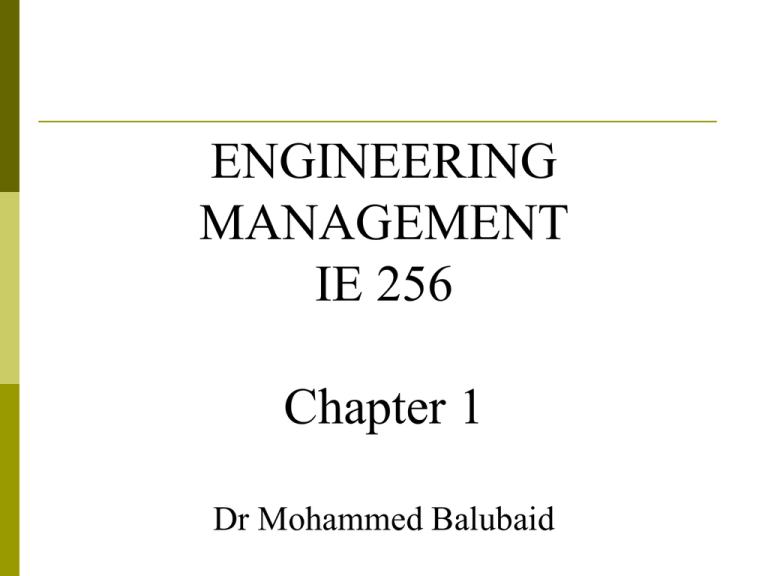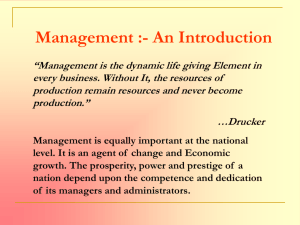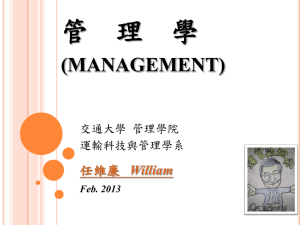ENGINEERING MANAGEMENT IE 256 Chapter 1
advertisement

ENGINEERING MANAGEMENT IE 256 Chapter 1 Dr Mohammed Balubaid Chapter outline What is Engineering? What is Management? Management Levels Managerial Skills What Managers Do? Functions of Managers Management Art or Science? What is Engineering Management? Engineering and Management What is an Engineer? Ingenium: Talent, natural capacity, or clever invention. Early applications of Clever Inventions based on Military Builders of Ingenious military machines?? Engineering and Management Engineering as a Profession The art of directing the great sources of power in nature, for the use and convenience of man. Engineers provide a public service not only in the goods and services they create for the betterment of society, but also by placing the safety of the public high on their design criteria Is it an art or profession? Engineering and Management Modern Definition of Engineering By ABET (Accrediting Board for Engineering and Technology) The profession in which a knowledge of the mathematical and natural sciences gained by study, experience, and practice which is applied with judgment to develop ways to utilize, economically, the materials and forces of the nature for the benefit of mankind. Engineer: A person applying his mathematical and science knowledge properly for mankind It is a discipline not an art. Types of engineers Many engineering applications require Cross-pollination or integration of multiple disciplines e.g Aerospace Engineers require knowledge of: •Material science •Electronic control •Computers •Production limitation •Finance •Logistic •Customer service Engineering Employment The corporations and firms of the past no longer exist. Employment opportunities Lie with companies of all sizes. Engineers of the future should expect to be Constantly improving their skills and marketability. Continuing education, flexibility, and a willingness to shift employment will be required of successful engineers Engineering and Management What is Management? McFarland identifies management as • an organizational or administrative process • a science, discipline or art • the group of people running an organization • an occupational career • Directing the actions of a group to achieve a goal in most efficient manner • Getting things done through people • Process of achieving organizational goals by working with and through people and organizational resources Engineering and Management Management Levels Top-level management (president, executive vice president) Middle managers (chief engineer, division head etc.) First-line managers (foreman, supervisor, section chief) Engineering and Management Level First-line Managers Middle Management Top Management Type of Job Directly supervise non-managers. Carry out the plans and objectives of higher management using the personnel and other resources assigned to them. Short-range operating plans governing what will be done tomorrow or next week, assign tasks to their workers, supervise the work that is done, and evaluate the performance of individual workers. Manage through other managers. Make plans of intermediate range to achieve the long-range goals set by top management, establish departmental policies, and evaluate the performance of subordinate work units and their managers. Provide and integrating and coordinating function so that the short-range decisions and activities of first-line supervisory groups can be orchestrated toward achievement of the long-range goals of the enterprise. Responsible for defining the character, mission, and objectives of the enterprise. Establish criteria for and review long-range plans. Evaluate the performance of major departments, and they evaluate leading management personnel to gauge their readiness for promotion to key executive positions. Engineering and Management Managerial Level Lowest Middle Top Skills required versus management Engineering and Management Managerial Skills: Managers need three types of skills: Technical: Specific subject related skills such as engineering, accounting, etc… Interpersonal: Skills related to dealing with others and leading, motivating, or controlling them Conceptual: Ability to discern the critical factors that will determine as organization’s success or failure. Ability to see the forest in spite of the trees. Engineering and Management Managerial Roles (What Managers Do) • Interpersonal roles • Informational Roles • Decisional Roles Engineering and Management Managerial Roles (What Managers Do) • Interpersonal roles Outward Figurehead role: Outward relationship Leader role: Downward relation Liaison role: Horizontal relation Horizontal Downward Engineering and Management Managerial Roles (What Managers Do) • Informational Roles Monitor Role: Collects information about internal operations and external events. Disseminator Role: Transforms information internally to everybody in organization (like a telephone switchboard) Spokesman Role: Public relations Engineering and Management Managerial Roles (What Managers Do) • Decisional Roles Entrepreneurial Role: Initiates changes, assumes risks, transforms ideas into useful products. Disturbance Handler Role: Deals with unforeseen problems and crisis. Resource Allocator Role: Distributing resources Negotiator Role: Bargains with suppliers, customers etc. in favor of enterprise Engineering and Management Functions of Managers •Planning: Selecting missions and objectives. Requires decision making. •Organizing: Establishing the structure for the objective. •Staffing: Keeping filled the organization structure •Leading: Influencing people to achieve the objective •Controlling: Measuring and correcting the activities Engineering and Management Management: Is it an art or science? Management has a body of specialized knowledge. This knowledge need not to be obtained in formal disciplined programs. Somewhere between art and science. Engineering Management (Discipline + art) Somewhere between art and science. Engineering and Management What is Engineering Management? Narrow definition: Directing supervision of engineers or of engineering functions. Proper Definition of Engineering Manager: Engineer possessing both abilities to apply engineering principles and skills in organizing and directing people and projects. Babcock Engineering Managers are distinguished from other managers because they possess both the ability to apply engineering principles and skill in organizing and directing people and projects. Prentice Hall, 2006 Engineering and Management Why Engineering Managers? Competition is global and companies need these people to compete successfully Engineering and Management Advantages of Understanding Technology in Top Management • Really understanding the business • Understanding technology driving the business today and technology that will change the business in future • Treating Research and Development as investment not an expense to be minimized • Spending more time on strategic thinking • Dedicating a customer’s problem (true marketing via customer relations) • Place a premium on innovation



